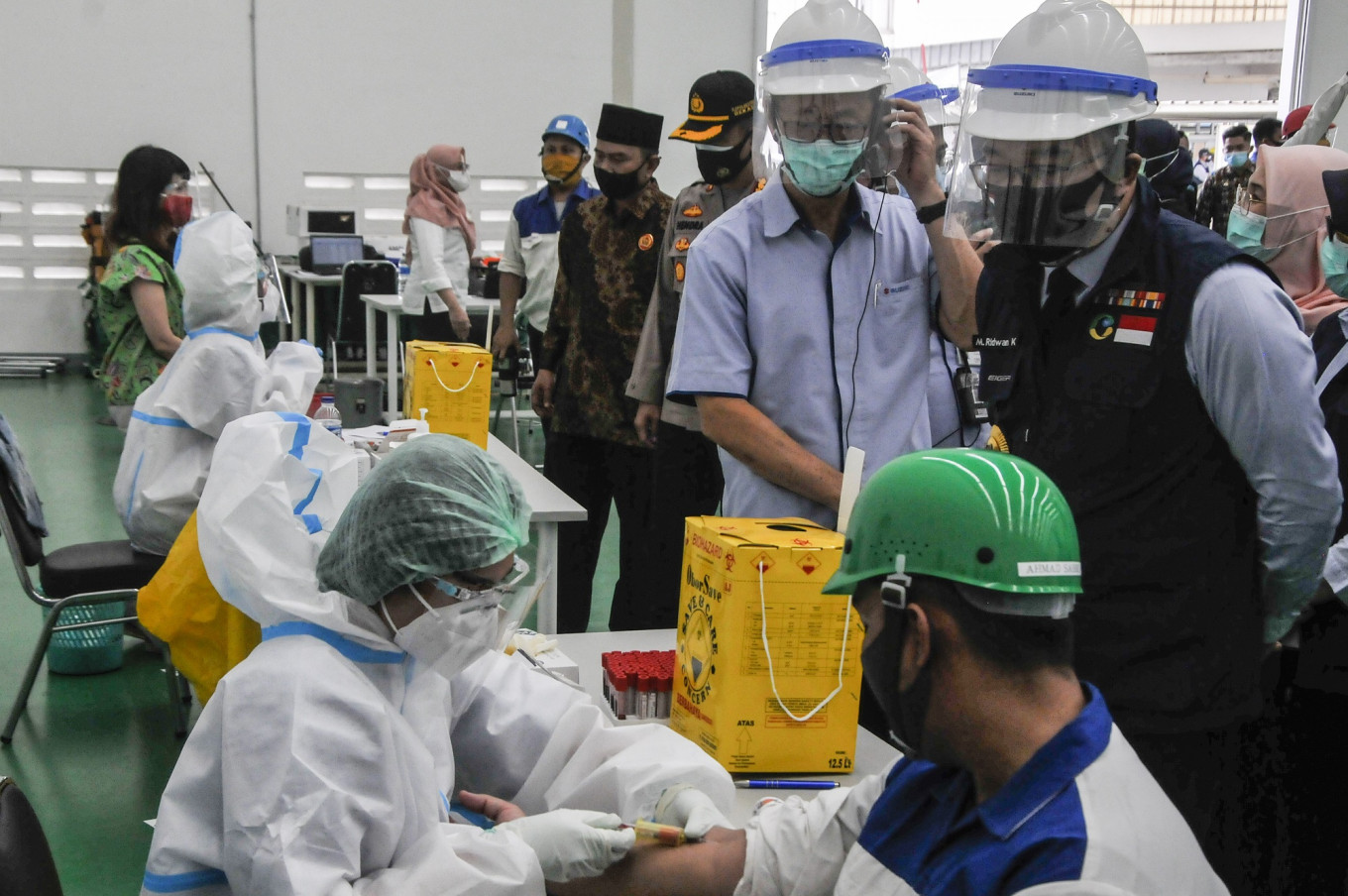Popular Reads
Top Results
Can't find what you're looking for?
View all search resultsPopular Reads
Top Results
Can't find what you're looking for?
View all search resultsOnly half of manufacturers comply with COVID-19 reporting requirement
“We’ve revoked the licenses of about 180 companies so far, either because they repeatedly failed to provide us with reports or their data wasn’t accurate,” an Industry Ministry director said.
Change text size
Gift Premium Articles
to Anyone
I
ndustry Minister Agus Gumiwang Kartasasmita has urged manufacturers that have obtained operational and mobility permits (IOMKI) to consistently provide the government with the required weekly operation report, noting that only 51 percent of permit holders have fully complied with the regulation.
The permits, which allow factories to operate during COVID-19 restrictions, are granted to companies that have established strict health protocols in their facilities. The companies are required to give the government weekly reports of their operations, according to an Industry Ministry circular letter.
As of late September, the ministry had issued more than 18,100 IOMKI to companies that employed some 5.14 million employees in total.
“The weekly reporting requirement has been a monitoring instrument for health protocol implementation in industrial areas. Sadly, only 51 percent of the companies have routinely provided us with the report,” Agus said in an online discussion held by the ministry on Tuesday.
In response to the pandemic, the central government and local administrations have restricted movement in certain areas and have asked or required many to work, study and pray at home to curb the spread of the virus. These restrictions, alongside physical distancing requirements, have affected the operation of manufacturers as many Indonesian factories have employees work in close proximity.
A Health Ministry regulation, however, allows factories to continue operating if they receive a permit from the Industry Ministry and strictly enforce health protocols.
The Industry Ministry’s industrial resiliency, zoning and international access (KPAII) director general, Dody Widodo, told The Jakarta Post on Tuesday that the compliance level had been suppressed because companies had to adjust to the reporting process during the initial stage of the permit policy.
“Before Circular Letter No.8/2020, companies weren’t required to provide weekly operational reports. When we make the report mandatory, there was an adjustment process which made the compliance level seem low,” he said.
He said the government was strictly monitoring the enforcement of health protocols in industrial zones and had taken action against manufacturers that had repeatedly failed to fulfill IOMKI requirements.
“We’ve revoked the licenses of about 180 companies so far, either because they repeatedly failed to provide us with reports or their data wasn’t accurate. There has been tremendous progress in terms of reporting compliance,” he said.
Indonesian Employers Association (Apindo) deputy chair Shinta Kamdani declined to answer the Post’s question regarding companies’ compliance with IOMKI requirements.
During the online discussion, Unilever Indonesia supply chain director Rizki Raksanugraha echoed Dody’s statement about the initial limited understanding and expressed hope that the government would provide more information about what the weekly reports had to include.
“Initially, we found the reporting challenging because we didn’t know if we needed to write the report for each factory or location and whether to send the report monthly or weekly,” he said, adding that the company was now in full compliance with IOMKI requirements.
Over the past months, COVID-19 clusters have been reported in several factories, including a Unilever facility in Cikarang, West Java, in late June. The infections prompted the company to temporarily close the factory.
The most recent cluster emerged on Sept. 21 at a PT Indonesia Epson Industry plant located in the East Jakarta Industrial Park in Cikarang. As of Oct. 6, 1,197 people connected to the plant had tested positive for COVID-19.
Dody said that despite rigorous enforcement of health protocols and monitoring by both manufacturers and the government, preventing an outbreak in factories had proven to be challenging as employees could catch the virus outside industrial zones.
“We are responsible for all activities that occur inside the industrial zone. It’s hard to trace the outbreak because employees can contract the virus in their homes and neighborhoods,” he said.










